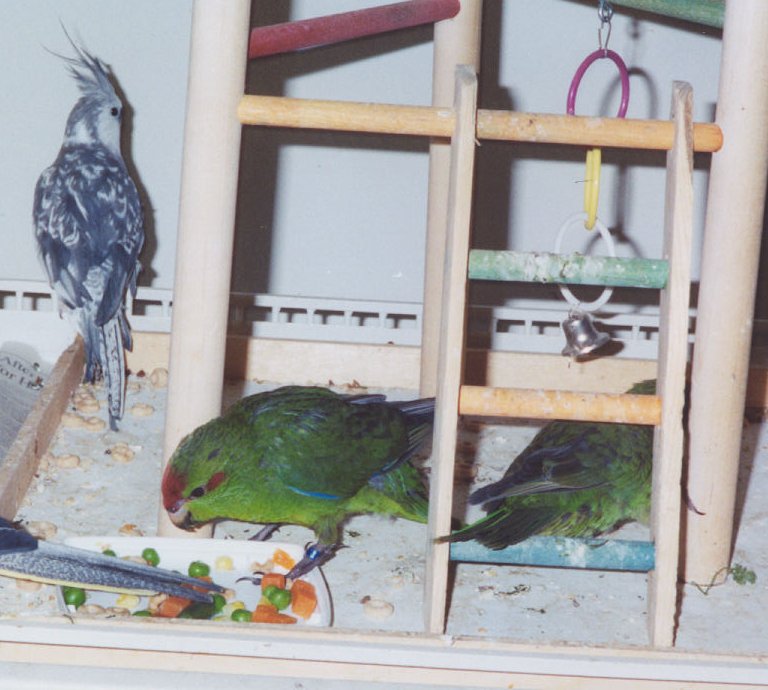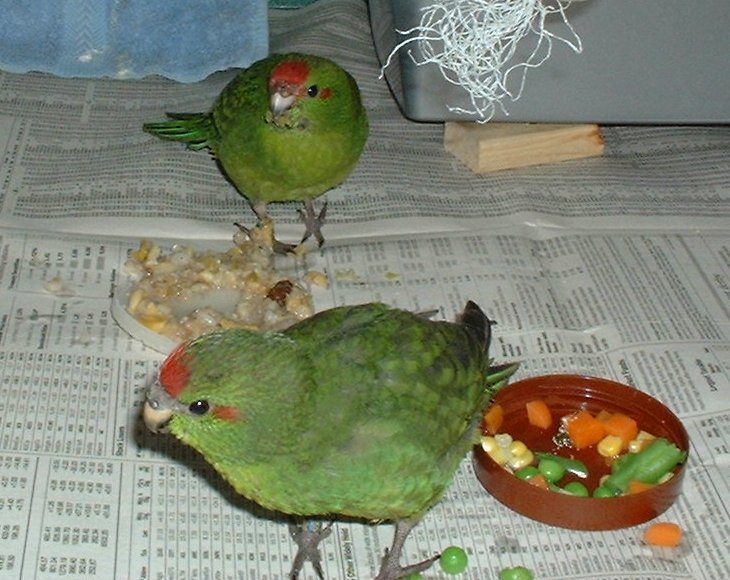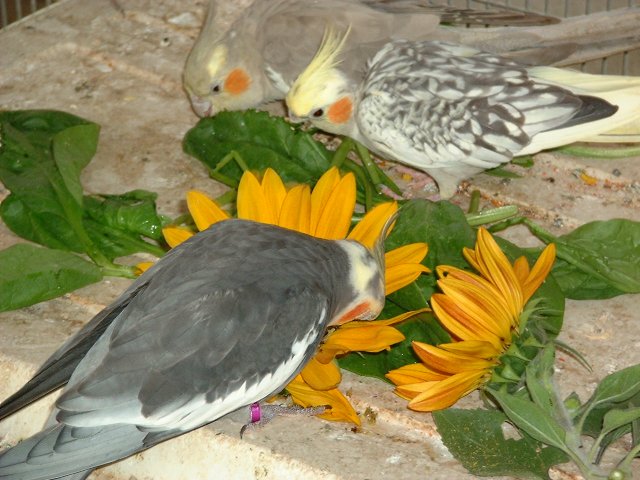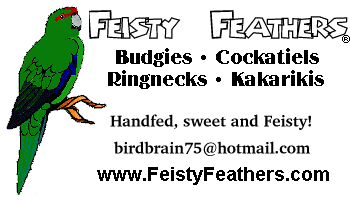
Malnutrition is the #1 Cause of Illness in Birds
Birds need a good diet just like every other animal. A poor diet creates a bird with a myriad of problems. It can lead to obesity, tumors and diabetes. It also compromises the immune system, making the bird more susceptible to infections. Even so, most people arenít feeding their birds right. Many give them only seed and water, the equivalent of a bread and water diet in humans. Usually this is due to ignorance.
My Bird Won't Eat That...
Feeding your birds a nutritional and varied diet is THE most important thing you can do to keep them healthy, yet most people keep their birds on seed-only diets, even if they know better. Many claim to have tried converting their birds to a better diet but their birds "just wonít eat anything else!" I probably shouldnít be surprised, considering that the United States is raising its children on fast food, greatly increasing their chances of having heart attacks and bypass surgeries at the age of 45.
Birds do have their preferences, but they should also be willing to accept a variety of foods. My birds get a veggie mix of green beans, lima beans, carrots, corn and peas. Most of my birds go for the corn first and then consume all but the carrots. Fry, my mitred conure, will eat everything but the lima beans. Ringnecks will eat the carrots. Peas are my kakarikisí first choice. Both corn and peas are high in starch. Fry loves all bread products. He often shares breakfast with me. He will ignore everything else and go for the bread, eating all but the "crust," even on muffins. This doesnít mean he wonít eat non-bread items. If I place an item in his dish he will eat it. If Iím eating something he will want some too (weíre sharing a chicken tamale as I write this). When a bird does not have access to a favorite food, it has to eat what is available.
My Seed is Better Than Your Seed...
You probably buy a seed mix with "fortified" or "gourmet" on the package, right? Iíll let you in on a little secret about seed mixes: one is just as good as another. While youíre paying $6.49 for 2 lbs. of that "Fiesta Fortified Gourmet Bird Food" Iím paying $8.25 for 25 lbs. of plain seed. Okay, so not everyone can afford to buy in bulk. However, many stores sell seed mixes that contain just seed. Sometimes these mixes arenít even a name brand or are packaged in-store. They are much cheaper.
"But wait! The seed I buy contains dried fruits, veggies and nutrient supplements." Does your bird actually eat any of those dried items or does it just pick out the seeds? Iíve found that birds a much more likely to try new foods if they are offered in a separate dish. If pellets are mixed in with seed (like manufacturers suggest) they are often ignored. The bird will just eat its seeds and dismiss the foreign item. Offer new items in a different bowl. Vitamin supplements do not work with seed mixes. If a seed mix claims to contain supplements what it means is that vitamins are sprayed onto some of the seeds. However, because all psittacines husk their seed before eating it, the vitamin-coated exterior is cast aside and only the uncoated seed itself is consumed. It is best to leave seed plain and supplement by offering other foods.
Seed is like bread- itís good, but in no way a complete diet. If bread is all you eat eventually you will have many problems due to malnutrition. Seed is perfectly healthy if it is supplemented with other foods. Some seeds are higher in fat than others, like sunflower, peanuts and safflower. These should be avoided, especially in species that are prone to obesity (Galahs, amazons, budgies). A few species can tolerate high fat but not many. You can increase the nutritional content of
seeds by sprouting them. In the wild birds eat seed still growing on the plant. The dry seed we offer our birds is nowhere near as nutritious as sprouted.
Pellets are designed to be a "complete" diet. They are supposed to provide all the vitamins and minerals a bird needs. This means you should NOT offer other foods, especially not cuttlebone, mineral block or vitamins. You risk overdosing your birds by feeding other foods with pellets. Most old-timer experts are against diets consisting solely of pellets. Birds need variety in their diet and pellets just don't give them that. These experts recommend no more than 25% of the diet consisting of pellets. Such a diet would be mostly seed, soft foods and fresh foods, with only some (25%) pellets for supplementation. This would be a safe way to offer other foods along with pellets.
The bulk of my current diet is seed. Pellets are offered in a separate dish, and yes, the birds do eat them even though they have seed. Every day I also offer a fresh or cooked food. This could be frozen veggies, fresh greens, fruit, pasta, eggs or Crazy Corn. These items are rotated so that every day the birds get a different fresh/cooked food.
Vitamin & Mineral Supplements
Birds have dry mouths. Vitamins are utterly useless when sprinkled on seed or dry foods. Putting them in water does no good either as they will only lose their potency and provide a breeding ground for bacteria. If you do want to use vitamin supplements, sprinkle them on your wet foods.
All birds on a seed diet should be offered cuttlebone and/or mineral block.
Grit should NOT be offered to psittacines. All hookbills husk their seed before consuming it, hence they have no need for grit. Some birds will also consume massive quantities of grit which will impact their crop. Grit is fine for birds that do not husk their seed (doves, pigeons).
Feeding a Varied Diet
Special notes on Iceburg Lettuce and Spinach:
Donít forget to give your bird fresh water too. Change it everyday. Some birds like to dunk
food in their water or use it as a toilet. Sometimes moving the dish to another location may
help. If not you'll just have to change the water more often. The rule of thumb is if you
wouldnít drink it, change it. I don't really approve of water bottles because people get lazy
changing them, they are hard to disinfect and often don't get checked often enough.
Toxic Foods and Things to Avoid
Most fruit pits are toxic. Remove them before feeding. NEVER feed avacado or chocolate, they are toxic. Also avoid any type of drug (even the legal kind). NO alcohol. NO caffeine. Even decaf coffee contains some caffeine. Don't let your birds have any. While we're on the subject of drugs, DON'T SMOKE AROUND YOUR BIRDS!!! This practice is bad enough for humans, but birds have much more sensitive respiratory systems. Mammal bacteria is also dangerous. Do not allow your birds to share food with the dog/cat or drink from their water bowls. Likewise, do not allow your birds to take food from your own mouth. If you are going to share food give them their own plate or at least don't offer them anything your mouth has touched.
 If you are having trouble converting your bird please see Getting Your Bird to Try New Foods. Below are the three reasons birds typically wonít convert.
If you are having trouble converting your bird please see Getting Your Bird to Try New Foods. Below are the three reasons birds typically wonít convert.

Why Birds "Wonít" Convert to a Healthy Diet
 What do I think? Honestly I donít know if pellets really are a complete diet or not. They are definitely not psychologically beneficial, even if they are dyed and molded into various shapes. When it comes down to it, Iím skeptical of anything advertising itself as being the only thing required. Most people feed their dogs and cats canned or dry diets only. Are these diets complete? Probably more so than bird pellets because theyíve been researched longer, but then why is my sisterís sheltie always hanging out under the cages eating dropped Crazy Corn and veggies? Hmm... I really don't think that one food item can be a "complete" diet, no matter how well-researched it is. Natural sources of nutrition are always better and more varied than a formulated diet. My personal opinion is to feed seed supplemented with a variety of fresh and cooked "soft" foods.
What do I think? Honestly I donít know if pellets really are a complete diet or not. They are definitely not psychologically beneficial, even if they are dyed and molded into various shapes. When it comes down to it, Iím skeptical of anything advertising itself as being the only thing required. Most people feed their dogs and cats canned or dry diets only. Are these diets complete? Probably more so than bird pellets because theyíve been researched longer, but then why is my sisterís sheltie always hanging out under the cages eating dropped Crazy Corn and veggies? Hmm... I really don't think that one food item can be a "complete" diet, no matter how well-researched it is. Natural sources of nutrition are always better and more varied than a formulated diet. My personal opinion is to feed seed supplemented with a variety of fresh and cooked "soft" foods. So what do birds need? Basically anything that a health food nut would
eat is what birds should be eating: lots of fruits and vegetables, low-fat, low-salt, grains,
etc. Use your imagination! Try some of my recipes. Here's a better idea of what you can feed: corn, peas, carrots, carrot tops, beans, legumes, rice (must be COOKED!), pasta, chicken, bread, egg, Crazy Corn, grapes, mangos, apples, peaches, pears, apricots, plums, kiwi, berries (whatever kind is in season), parsley, chickweed and bananas. This is just to give you an idea. You can feed much more than this. Keep it varied.
So what do birds need? Basically anything that a health food nut would
eat is what birds should be eating: lots of fruits and vegetables, low-fat, low-salt, grains,
etc. Use your imagination! Try some of my recipes. Here's a better idea of what you can feed: corn, peas, carrots, carrot tops, beans, legumes, rice (must be COOKED!), pasta, chicken, bread, egg, Crazy Corn, grapes, mangos, apples, peaches, pears, apricots, plums, kiwi, berries (whatever kind is in season), parsley, chickweed and bananas. This is just to give you an idea. You can feed much more than this. Keep it varied.
Iceburg lettuce has no nutritional value. It's basically all water. Spinach contains a chemical which binds to calcium, making it unable to be absorbed by the body (so much for Popeye). It is healthy but should only be fed sparingly.

© 2002 Feisty Feathers